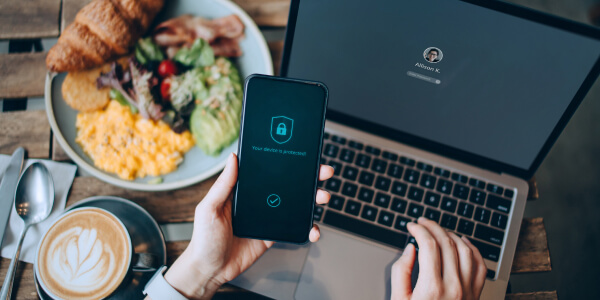
Car scams and how to avoid them
Online marketplaces are a great way to buy and sell pre-owned vehicles. Unfortunately, fraudsters also use them to scam both buyers and sellers out of their money.
Here’s how you can spot if a fraudster is trying to scam you, and what you can do to protect yourself:
1. Car seller scams
Picture this… you’re browsing online classified ads to find your next car. And there it is! The perfect vehicle with all the trimmings, low mileage and a full-service history at an unbeatable price.
You contact the seller as quick as you can. Luckily it’s still available – but not for long according to the seller. They’re under pressure to sell fast due to emigration, a death in the family, a sick relative or a debt that needs to be settled. There are many buyers interested, so if you want it you’ll need to act fast.
Don’t want to miss the deal of the century? Ok, then you’ll need to pay up – a deposit or even the full amount. And don’t worry – you won’t pay the seller directly, you’ll be directed to a legitimate-looking Escrow site where they will safeguard your payment until you get the keys to your new car.
Except you won’t get those keys because there never was a car. These scammers are skilled fraudsters who lure their victims in with irresistible deals and compelling stories to rush payments.
How to protect yourself
- Research the vehicle and benchmark the asking price against the current market value. The golden rule is that if the deal seems too good to be true, it probably is.
- It’s always a good idea to profile the seller to make sure they are who they say they are. A quick social media search should put a face to the name. If you can’t find them anywhere, rather find a different deal. Don’t be fooled though, this is only one test because some scammers may set up fake social media profiles.
- Be cautious if the seller is hesitant to meet in person and offers many reasons why he/she is not available – even if those excuses tug on your heartstrings. Scammers will use your empathy against you.
- If the seller only wants to engage over email, ask for a phone number and call them up – do not do any deals via email alone.
- Meet the seller in person, in a public, well-lit space – and of course, see the car that’s for sale.
- If an upfront payment is requested, walk away. Never pay for a car that you haven’t seen and that isn’t in your possession as you make the payment.
- Don’t be pushed into a quick payment because of a fake emergency. Rather trust your gut if the sale doesn’t feel right, or if it’s too rushed.
- Do not automatically trust an Escrow site that a seller recommends. Instead, protect yourself with Standard Bank’s Escrow Service, which makes every buyer and seller trustworthy. Using an established Escrow service also means a seller can’t scam you with a fraudulent Escrow account.
2. Car purchase scams
In these scams, the fraudster poses as the buyer of a vehicle. They have no intention of actually purchasing your used car though. Instead, they will try to scam you out of your money, your personal details or your car and then disappear.
However, there are many red flags that will alert you to their intentions and the fact that they are not serious buyers:
- They don’t ask many questions about the car. This is a sure sign that they aren’t actually interested in the vehicle you’re selling and they are after something else instead. Be aware though, some scammers are silver-tongued masters at deception and may ask all the right questions to gain your trust.
- They’ve contacted you as a third-party and are giving you the impression that:
- There are immediate buyers for your car
- Finance has already been approved for these potential buyers
- Buyers are willing to pay more than your asking price
- The potential buyer is making unusual requests – particularly around asking for your personal and banking details – and it’s making you uncomfortable.
How to protect yourself
- If a buyer contacts you via email, ask for their number and arrange to set up a call. Fraudsters will quickly disappear.
- Do not share any personal information or banking details with them.
- Do not pay an upfront fee, however small, for third-party services guaranteeing you a buyer for your vehicle.
- When you do speak to potential buyers, pay attention to your intuition. If you’re uncomfortable for any reason, wait for another buyer.
- Always check and confirm the identity of potential buyers before agreeing to meet with them.
- If you’ve arranged a test drive, meet in a public place and bring someone with you – you should also take a photo of the buyer’s driver’s license before they test drive the vehicle.
- Do not leave the car or its keys unattended or left in the ignition. A key swop is a common method used by criminals to steal a car.
- As a seller, you can also protect yourself with Standard Bank’s Escrow Service as the trade will only start when the buyer has the agreed funds – and you don’t need to share your personal banking details.
Report fraud
If you’re in doubt about a particular payment or if you think you may be a victim of fraud, contact us immediately.
We also recommend you file a police report.
Standard Bank’s Fraud Line
- South Africa: 0800 020 600
- International: +27 10 249 0100
Contact details for Personal customers:
- South Africa: 0860 123 000
- International: +27 11 299 4701
- Email: [email protected]
Contact details for Business customers:
Please reach out to your Relationship Banker, if you don't have their contact details, call;
- South Africa: 0860 109 075 - select option 2 and choose your province
- International: +27 11 299 4633
Stay up to date with the latest scams in South Africa.



